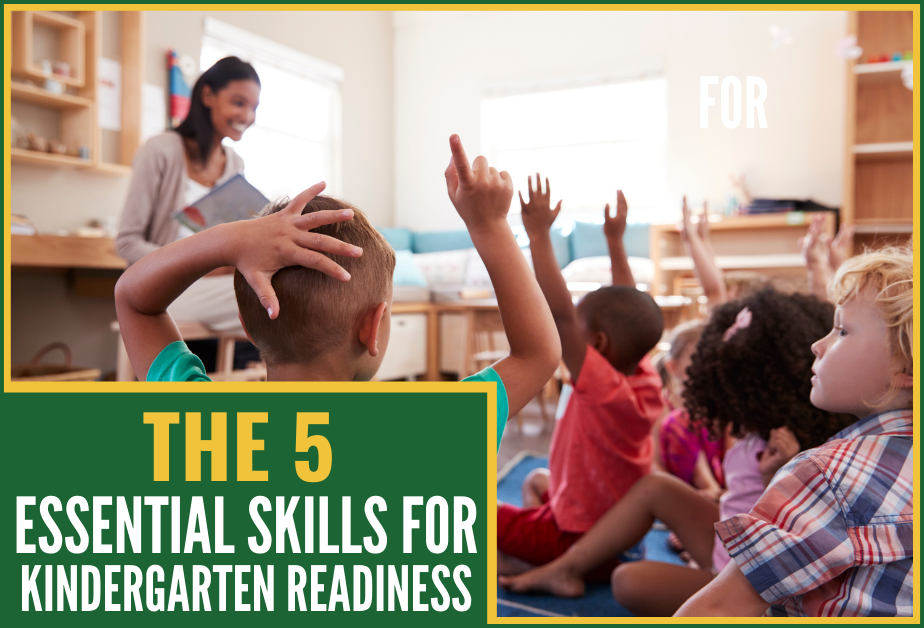5 Essential Skills for Kindergarten Readiness
Sending your little one off to kindergarten for the first time is an exciting milestone, but it can also be a nerve-wracking time for many parents and children. Kindergarten is one of the most significant stages of childhood, marking the transition from the comfort of home to a new academic environment. It's a big step, but with the right preparation, you can help your child become ready to thrive in the classroom. So how can you make sure your little one is ready to take the next step? What skills do children need in order to be ready for the first day of kindergarten?
In this post, we'll take a close look at the definition of “kindergarten readiness” and discuss what you can do as a parent to effectively prepare your little one for kindergarten. We'll also cover five essential kindergarten readiness skills that are sure to give your child a positive head start.
What is kindergarten readiness?
When we talk about ”kindergarten readiness”, it refers to more than the ability to identify numbers, letters, shapes, and colors. It also encompases a set of critical developmental milestones that are important for children to achieve before starting school.
Which skills are essential in order to be ready for kindergarten?
Self-regulation skills
“Self-regulation” refers to a person’s ability to control one’s own emotions and behavior, especially in challenging situations. When children develop the ability to self-regulate, it allows them to make positive choices by thinking about the best course of action in a given situation. This skill set also enables kids to effectively manage their own feelings and express themselves clearly.
Self-regulation is a vital skill that aids in each child’s kindergarten readiness. It affects how well children can learn, especially when they're expected to work independently. It also helps them become more resilient in times of change, and more adaptable in new settings (like the first day of kindergarten).
Reading and writing skills
Children fall on various parts of the spectrum when it comes to mastering the basics of reading, sounding out letters, and learning the alphabet. Some may even be at the level of writing words. No matter where your child falls, it’s important that kindergarteners have a basic understanding when it comes to recognizing basic words. Children at this age should also be able to write their own names, and begin to write simple sentences.
You can help your little one develop these skills by playing games and incorporating toys that help them practice learning basic words. Consider using tools like flashcards and letter magnets. It’s also beneficial to carve out time to read together each day in order to reinforce basic reading skills, which will help boost your child’s confidence in kindergarten.
Fine motor skills
Another important kindergarten readiness skill is the ability to to pick up small objects, draw, and stack blocks. You can help children practice these skills by playing games like patty-cake, using play-dough, and even making silly faces using their fingers.
Once children reach the age of three, you can even start practicing writing letters and numbers. By the age of four, youngsters should be able to hold their favorite coloring utensils properly without breaking them or leaving marks on the table. Young children may also be able to color inside the lines of a coloring book.
Math and counting skills
From understanding basic counting to practicing simple addition and subtraction, kindergarteners will need to master basic math skills that will set them up for success in school. Since kindergarten mainly focuses on numbers, shapes, and patterns, it’s beneficial to familiarize your child with these basic concepts.
You can start teaching your little one the numbers one through ten by pointing to each number and using rhymes or other helpful methods. It’s also helpful to practice counting while stacking building blocks or playing with play-dough. Children can also learn to identify basic shapes like squares, circles, and triangles in their day-to-day surroundings.
Gross motor skills
“Gross motor skills” refer to how well individuals can control their large muscle movements as they relate to activities like throwing, catching, kicking, and running. These skills are essential for children because they'll be used during a variety of physical activities during kindergarten.
Be sure to give your little one plenty of opportunities for outdoor play at home or outside. Practice playing games that involve throwing and catching a ball, and other active games like “Simon Says”.
Transitioning to kindergarten can seem like a daunting process for both parents and kids, but you can make this exciting milestone go smoothly for your little one by following these tips!
At Mrs. Myers' Learning Lab, our Kindergarten Readiness program is called "Bookworms" because this active class lays the foundation for reading and learning. When children enroll in this class, they will be prepared for academic success when it comes to a deeper knowledge of letter sounds, numbers, basic math concepts, fine motor skills, social skills, and other essential foundational learning concepts. This is the program for building pre-literacy and learning readiness skills so that your child will be prepared for academic success, and ready to enjoy learning!





